中考形容词和副词的用法总结
2023年中考英语语法笔记:形容词与副词
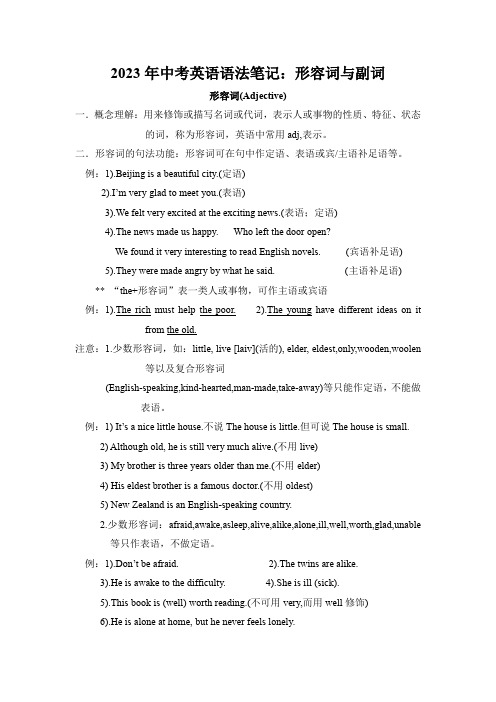
2023年中考英语语法笔记:形容词与副词形容词(Adjective)一.概念理解:用来修饰或描写名词或代词,表示人或事物的性质、特征、状态的词,称为形容词,英语中常用adj,表示。
二.形容词的句法功能:形容词可在句中作定语、表语或宾/主语补足语等。
例:1).Beijing is a beautiful city.(定语)2).I’m very glad to meet you.(表语)3).We felt very excited at the exciting news.(表语;定语)4).The news made us happy. Who left the door open?We found it very interesting to read English novels. (宾语补足语)5).They were made angry by what he said. (主语补足语)** “the+形容词”表一类人或事物,可作主语或宾语例:1).The rich must help the poor. 2).The young have different ideas on it from the old.注意:1.少数形容词,如:little, live [laiv](活的), elder, eldest,only,wooden,woolen 等以及复合形容词(English-speaking,kind-hearted,man-made,take-away)等只能作定语,不能做表语。
例:1) It’s a nice little house.不说The house is little.但可说The house is small.2) Although old, he is still very much alive.(不用live)3) My brother is three years older than me.(不用elder)4) His eldest brother is a famous doctor.(不用oldest)5) New Zealand is an English-speaking country.2.少数形容词:afraid,awake,asleep,alive,alike,alone,ill,well,worth,glad,unable等只作表语,不做定语。
中考英语语法---形容词和副词
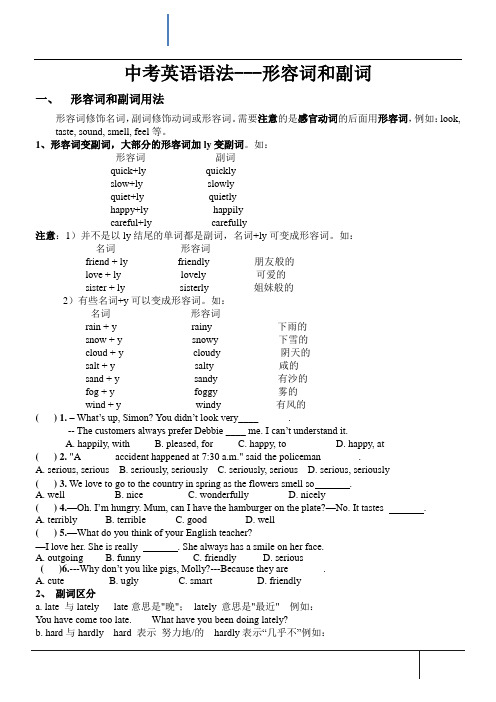
中考英语语法---形容词和副词一、形容词和副词用法形容词修饰名词,副词修饰动词或形容词。
需要注意的是感官动词的后面用形容词,例如:look, taste, sound, smell, feel等。
1、形容词变副词,大部分的形容词加ly变副词。
如:形容词副词quick+ly quicklyslow+ly slowlyquiet+ly quietlyhappy+ly happilycareful+ly carefully注意:1)并不是以ly结尾的单词都是副词,名词+ly可变成形容词。
如:名词形容词friend + ly friendly 朋友般的love + ly lovely 可爱的sister + ly sisterly 姐妹般的2)有些名词+y可以变成形容词。
如:名词形容词rain + y rainy 下雨的snow + y snowy 下雪的cloud + y cloudy 阴天的salt + y salty 咸的sand + y sandy 有沙的fog + y foggy 雾的wind + y windy 有风的( ) 1.–What’s up, Simon? You didn’t look very____ .-- The customers always prefer Debbie ____ me. I can’t understand it.A. happily, withB. pleased, forC. happy, toD. happy, at( ) 2. "A ______ accident happened at 7:30 a.m." said the policeman _______.A. serious, seriousB. seriously, seriouslyC. seriously, seriousD. serious, seriously( ) 3. We love to go to the country in spring as the flowers smell so .A. wellB. niceC. wonderfullyD. nicely( ) 4.—Oh. I’m hungry. Mum, can I have the hamburger on the plate?—No. It tastes .A. terriblyB. terribleC. goodD. well( ) 5.—What do you think of your English teacher?—I love her. She is really . She always has a smile on her face.A. outgoingB. funnyC. friendlyD. serious( )6.---Why don’t you like pigs, Molly?---Because they are ______ .A. cuteB. uglyC. smartD. friendly2、副词区分a. late 与lately late意思是"晚";lately 意思是"最近" 例如:You have come too late. What have you been doing lately?b. hard与hardly hard 表示努力地/的hardly表示―几乎不‖例如:he works hard. I can hardly finish it in a week.c. close与closely close意思是"近";closely 意思是"仔细地" 例如:He is sitting close to me. Watch him closely.d. deep与deeply deep意思是"深"表示空间深度;deeply时常表示感情上的深度,"深深地" 例如:He pushed the stick deep into the mud. Even father was deeply moved by the movie.e. high与highly high表示空间高度;highly表示程度,相当于much 例如The plane was flying high. I think highly of your opinion.f. wide与widely wide表示空间宽度;widely意思是"广泛地","在许多地方" 例如:He opened the door wide. English is widely used in the world.( ) 1 Mingming got up very _______,so he came to school half an hour ______.te; latelyB. lately; lateC. lately; latelyD. late; late二、形容词与副词的原级、比较级和最高级1、形容词和副词有比较级和最高级的变化大多数形容词(性质形容词)和副词有比较级和最高级的变化,即原级、比较级和最高级,用来表示事物的等级差别。
中考英语形容词,副词知识点
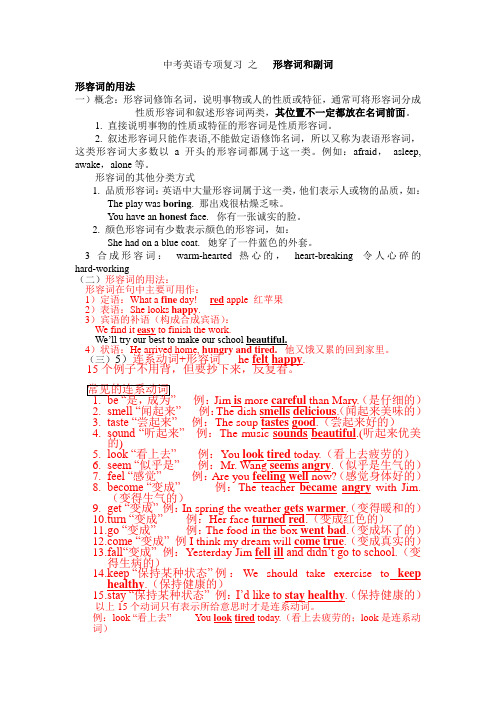
中考英语专项复习之形容词和副词形容词的用法一)概念:形容词修饰名词,说明事物或人的性质或特征,通常可将形容词分成性质形容词和叙述形容词两类,其位置不一定都放在名词前面。
1. 直接说明事物的性质或特征的形容词是性质形容词。
2. 叙述形容词只能作表语,不能做定语修饰名词,所以又称为表语形容词,这类形容词大多数以a开头的形容词都属于这一类。
例如:afraid,asleep, awake,alone等。
形容词的其他分类方式1. 品质形容词:英语中大量形容词属于这一类,他们表示人或物的品质,如:The play was boring. 那出戏很枯燥乏味。
You have an honest face. 你有一张诚实的脸。
2. 颜色形容词有少数表示颜色的形容词,如:She had on a blue coat. 她穿了一件蓝色的外套。
3 合成形容词:warm-hearted 热心的,heart-breaking 令人心碎的hard-working(二)形容词的用法:形容词在句中主要可用作:1)定语:What a fine day! red apple 红苹果2)表语:She looks happy.3)宾语的补语(构成合成宾语):We find it easy to finish the work.We’ll try our best to make our school beautiful.4)状语:He arrived home, hungry and tired.他又饿又累的回到家里。
(三)5)连系动词+形容词he felt happy.15个例子不用背,但要抄下来,反复看。
例:Jim is more careful than Mary.(是仔细的)2.smell “闻起来”例:The dish smells delicious.(闻起来美味的)3.taste “尝起来”例:The soup tastes good.(尝起来好的)4.sound “听起来”例:The music sounds beautiful.(听起来优美的)5.look “看上去”例:You look tired today.(看上去疲劳的)6.seem “似乎是”例:Mr. Wang seems angry.(似乎是生气的)7.feel “感觉”例:Are you feeling well now?(感觉身体好的)8.become “变成”例:The teacher became angry with Jim.(变得生气的)9.get “变成”例:In spring the weather gets warmer.(变得暖和的)10.t urn “变成”例:Her face turned red.(变成红色的)11.g o “变成” 例:The food in the box went bad.(变成坏了的)12.c ome “变成”例I think my dream will come true.(变成真实的)13.f all“变成”例:Yesterday Jim fell ill and didn’t go to school.(变得生病的)14.k eep “保持某种状态”例:We should take exercise to keephealthy.(保持健康的)15.s tay “保持某种状态”例:I’d like to stay healthy.(保持健康的)以上15个动词只有表示所给意思时才是连系动词。
中考英语形容词与副词复习
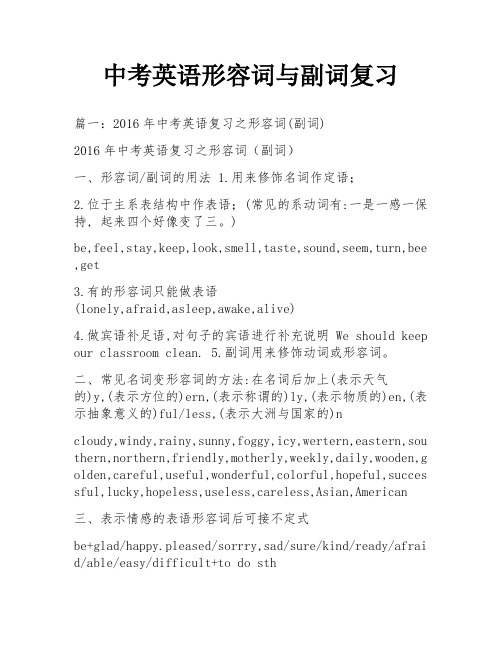
中考英语形容词与副词复习篇一:2016年中考英语复习之形容词(副词)2016年中考英语复习之形容词(副词)一、形容词/副词的用法 1.用来修饰名词作定语;2.位于主系表结构中作表语;(常见的系动词有:一是一感一保持, 起来四个好像变了三。
)be,feel,stay,keep,look,smell,taste,sound,seem,turn,bee ,get3.有的形容词只能做表语(lonely,afraid,asleep,awake,alive)4.做宾语补足语,对句子的宾语进行补充说明 We should keep our classroom clean.5.副词用来修饰动词或形容词。
二、常见名词变形容词的方法:在名词后加上(表示天气的)y,(表示方位的)ern,(表示称谓的)ly,(表示物质的)en,(表示抽象意义的)ful/less,(表示大洲与国家的)ncloudy,windy,rainy,sunny,foggy,icy,wertern,eastern,sou thern,northern,friendly,motherly,weekly,daily,wooden,g olden,careful,useful,wonderful,colorful,hopeful,succes sful,lucky,hopeless,useless,careless,Asian,American三、表示情感的表语形容词后可接不定式be+glad/happy.pleased/sorrry,sad/sure/kind/ready/afrai d/able/easy/difficult+to do sth四、形容词(副词)比较级、最高级的构成(一)以er,ow,ble,ple,y结尾的双音节词和单音节词:①一般在词尾直接加er或est; ②以不发音的e结尾的, 在词尾加r 或st;③以“辅音字母+y”结尾,先把y变为i,再加er或est; ④.以重读闭音节结尾,且末尾只有一个辅音字母的,双写末尾的辅音字母,再加er/est.fat,thin,sad,hot,big,red,wet.(二)末尾不是以er,ow,ble,ple,y结尾的双音节词和所有多音节词直接在单词前加more/most; (三)以-ly结尾的副词和以-ing/-ed结尾的形容词直接在单词前加more/most; (四)不规则变化(good/well,many/much,bad/badly/ill,little,far,old)good/well-better-best many/much-more/most little-less-leastbad/badly/ill-worse-worst far-farther/further-farthest/furthest old-older/elder-oldest/eldest五、形容词/副词原级的用法1.可以用quite,very,so,too,enough修饰原级;2. as+原级+as3. not+as/so+原级+as4.甲是乙的几倍(甲+is+倍数+as…as+乙)This bridge is three times as long as that one. Your room is twice as large as mine.六、形容词/副词比较级的用法 1.than是比较级的标志词2.句中出现两个比较对象或含两个人/物时,用比较级;3. much,far,even,a little,a lot,a bit常用于比较级之前;4.Which/Who+比较级,A or B?5.甲+be+the+比较级+of the two(甲是两者中较…的)6.甲+be+比较级+than+any other+单数名词(甲比其它的任何一个都…)7.倍数+比较级+than(表示几倍于) This classroom is two times bigger than that one. 8.比较级+and+比较级(越来越…)a.单音节词和以er,ow,ble,ple,y结尾的双音节词:比较级+and+比较级 b.部分双音节词和多音节词:more and more+多音节词原形 9.the+比较级……,the+比较级……(越……,就越……)七、形容词/副词最高级的用法 1.the 是最高级的标志词;2.句中出现≥3个比较对象时,用最高级;3.句中出现of all,of the three,that I have ever seen 时,用最高级;4.Which/Who+is+the+最高级,甲、乙or 丙?5.表示最……之一,要用“one of+the+形容词最高级+复数名词+表示范围的介词短语”6.序数词后的形容词一般要用最高级(表示第几最……) The Yello w River is the second longest river in China.7.形容词最高级前一般要加the,但若最高级前出现了形容词性物主代词或名词所有格形式,则不再用the.8.副词最高级前一般不用定冠词the.翻译下列短语和句子:1.越来越胖2.越来越漂亮3.越来越热4.越来越无聊5.越来越瘦6.越来越高兴7.越来越生气8.越来越饿9.越来越伤心10.越来越冷 11.越来越大12.越来越粗心 13.越来越早 14.越来越多15.越来越好 16.越来越危险17.越来越少18.越来越疲惫19.你越认真,你犯的错误就越少。
中考英语语法一点通——形容词和副词
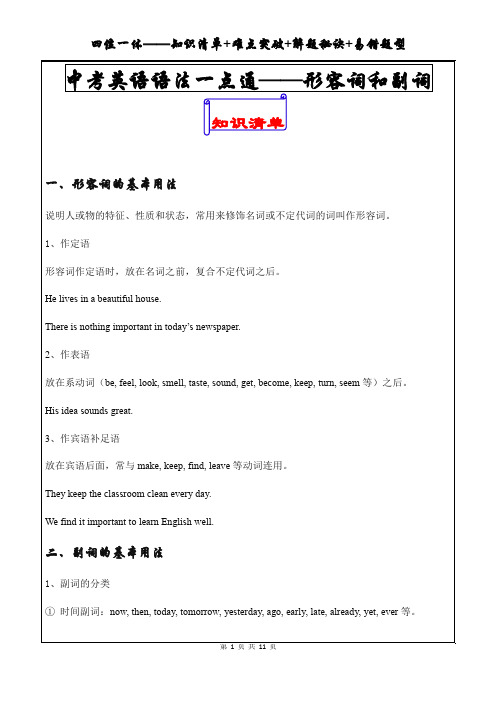
放在系动词(be, feel, look, smell, taste, sound, get, become, keep,turn, seem等)之后。
His idea sounds பைடு நூலகம்reat.
3、作宾语补足语
放在宾语后面,常与make, keep, find, leave等动词连用。
They keep the classroom clean every day.
colder
coldest
以不发音e结尾的词+r/st
wide
wider
widest
large
larger
largest
单个辅音字母结尾的重读闭音节词,双写末尾辅音字母+er/est
big
bigger
biggest
hot
hotter
hottest
以辅音字母+y结尾的词,变y为i+er/est
heavy
③方式副词:quickly, happily, loudly, suddenly, luckily, badly, easily, fast等,方式副词大多数由“形容词+ly”构成。
程度副词:very, quite, too, so, rather等,程度副词用来修饰形容词和副词。
疑问副词:when, where, why, how, how long, how soon, how far, how often, how much等。
Unfortunately, he was away when I arrived.(修饰整个句子)
2作表语
作表语的副词,大多数表示位置或者状态,如:out, in, on,back, down, up, off, away, upstairs, downstairs等。
中考专题复习形容词和副词
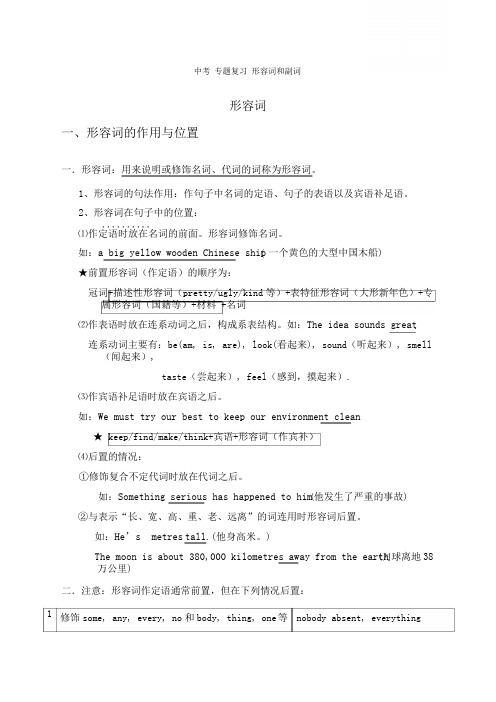
( .. .(.(月中考 专题复习 形容词和副词形容词一、形容词的作用与位置一.形容词:用来说明或修饰名词、代词的词称为形容词。
1、形容词的句法作用:作句子中名词的定语、句子的表语以及宾语补足语。
2、形容词在句子中的位置:..........⑴作定语时放在名词的前面。
形容词修饰名词。
如:a big yellow wooden Chinese ship 一个黄色的大型中国木船)★前置形容词(作定语)的顺序为:冠词+描述性形容词(pretty/ugly/kind 等)+表特征形容词(大形新年色)+专属形容词(国籍等)+材料 +名词⑵作表语时放在连系动词之后,构成系表结构。
如:The idea sounds great连系动词主要有:be(am, is, are), look(看起来), sound (听起来), smell(闻起来),taste (尝起来), feel (感到,摸起来).⑶作宾语补足语时放在宾语之后。
如:We must try our best to keep our environment clean★ keep/find/make/think+宾语+形容词(作宾补)⑷后置的情况:①修饰复合不定代词时放在代词之后。
如:Something serious has happened to him 他发生了严重的事故)②与表示“长、宽、高、重、老、远离”的词连用时形容词后置。
如:He’s metres tall .(他身高米。
)The moon is about 380,000 kilometres away from the earth 球离地 38 万公里)二.注意:形容词作定语通常前置,但在下列情况后置:1 修饰 some, any, every, no 和 body, thing, one 等 nobody absent, everything构成的复合不定代词时2以-able,-ible结尾的形容词可置于有最高级或only修饰的名词之后3alive,alike,awake,aware,asleep等可以后置4和空间、时间、单位连用时5成对的形容词可以后置6形容词短语一般后置possiblethe best book available,the only solution possiblethe only person awakea bridge50meters longa huge room simple and beautifula man difficult to get on with二、常见考点1.只能作表语的形容词:afraid害怕;alone独自的;asleep睡着的;awake醒着的;alive活着的;well健康的;ill病的;frightened害怕的例如,the man is ill.(正)the ill man is my uncle.(误)2.只能作定语的形容词:little小的;only唯一的;wooden木质的;woolen羊毛质的;elder年长的例如,my elder brother is in beijing.(正)my brother is elder.(误)3.貌似副词的形容词:lonely独自的;friendly友好的;lively生动的;lovely可爱的4.复合形容词:snow-white雪白的english-speaking说英语的;glass-topped玻璃罩的;full-time全日制的;well-known众所周知的;kind-hearted善良的;man-made人造的;take-away可以带走的;ten-year-old十岁的。
形容词副词用法归纳

形容词和副词用法&广东高考一、形容词1. 形容词的位置:修饰语一般应置于被修饰语之前注意:在下列情况下,修饰语应置于被修饰的名词后:(1) something, anything, nothing everything +形容词。
Eg: There' s nothing wrong with the electric cooker.(2) 作定语用的分词短语Eg: They live in a village called Gum Tree.2. 形容词在句子中的成分(1).在名词之前修饰名词,作定语•Eg: a. There are many beautiful flowers in the park. b. We saw a moving film.(2).在be 动词后,或者系动词feel, look, sou nd, taste, smell, seem 后,作表语.Eg: a. Our school is new and big. b. The milk smells terrible, it seems bad。
(3) 在宾语后作宾语补足语.:think/find/ feel/ make + it (形宾)+ adj. +真正的宾语Eg: a. We all think it terrible to go through such an experienee.b. He ofte n makes his mother an gry.3. 在英语中有些表示“使人….”的动词,把其变成现在分词或过去分词当形容词使用。
其中现在分词~ing形式表示“令人...... "修饰物;过去副词~ed形式修饰人(被动),这一类动词如下:In terest, excite, thrill, surprise, shock, amaze,ast oni sh, amuse, please, annoy, con fuse, upset, concern, worry, move, touch, satisfy, disappo in t, i nspire, en courage, etc.a/ an/ the + 形容词+名词be / 系动词(look/sound/ taste/ smell/ feel / seem/stay/ keep ….)+ 形容词主语+谓语+宾语+形容词(宾补)EX: Fill in the bla nks with the right form of the give n words.1. That would be a very ___________ (reason) thing to do in a big city.2. Mary felt _____________ (please) because there were many emtpy seats in the room.3. This proverb is saying we habve to let things go in their _____________ (nature) course.4. It was a little far to her car and it was a _____________ (fog) day yesterday.5. The _________ (busy) time is aroudn the Spring Festival.6. The organization organizes _____________ (week) programs at the Skateistan Cambodia.7. Asimov'books cover _____________ (vary) topics in scie nee.8. The terrible film made the girl stay ___________ (wake) all the night.9. Her mother looked ____________ (worry) and she sat still there for a long time.10. People are very _____________ (friend) and always welcome visitors all over the world.、副词1、副词的位置及作用:通常作状语,可修饰动词,形容词或整个句子。
初中英语中考语法形容词和副词总结归纳
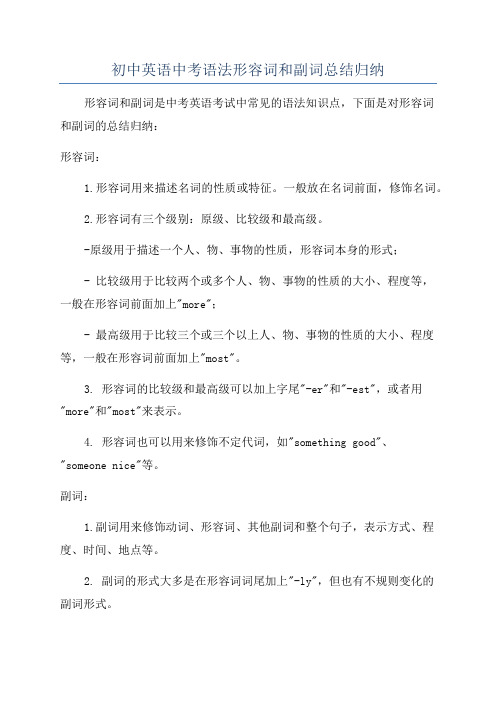
初中英语中考语法形容词和副词总结归纳形容词和副词是中考英语考试中常见的语法知识点,下面是对形容词和副词的总结归纳:形容词:1.形容词用来描述名词的性质或特征。
一般放在名词前面,修饰名词。
2.形容词有三个级别:原级、比较级和最高级。
-原级用于描述一个人、物、事物的性质,形容词本身的形式;- 比较级用于比较两个或多个人、物、事物的性质的大小、程度等,一般在形容词前面加上"more";- 最高级用于比较三个或三个以上人、物、事物的性质的大小、程度等,一般在形容词前面加上"most"。
3. 形容词的比较级和最高级可以加上字尾"-er"和"-est",或者用"more"和"most"来表示。
4. 形容词也可以用来修饰不定代词,如"something good"、"someone nice"等。
副词:1.副词用来修饰动词、形容词、其他副词和整个句子,表示方式、程度、时间、地点等。
2. 副词的形式大多是在形容词词尾加上"-ly",但也有不规则变化的副词形式。
3. 副词有原级和比较级,形式和形容词的比较级一样,可以在副词前面加上"more"来表示。
注意事项:1.形容词和副词的比较级和最高级要根据词的性质和词尾变化,不是所有形容词和副词都可以直接加上字尾来表示比较级和最高级。
2.形容词和副词的用法、位置和修饰的词性有一定的规律,需要具体问题具体分析。
以上是对初中英语中考语法中形容词和副词的总结归纳,希望能够帮助到你。
- 1、下载文档前请自行甄别文档内容的完整性,平台不提供额外的编辑、内容补充、找答案等附加服务。
- 2、"仅部分预览"的文档,不可在线预览部分如存在完整性等问题,可反馈申请退款(可完整预览的文档不适用该条件!)。
- 3、如文档侵犯您的权益,请联系客服反馈,我们会尽快为您处理(人工客服工作时间:9:00-18:30)。
中考形容词和副词的用法总结形容词和副词都是起修饰作用的词,形容词修饰名词和代词。
副词修饰动词,形容词和其他副词或整个句子。
一形容词的构成1 本身是形容词。
如:good,happy等。
2 由名词加y构成:sun—sunny,wind—-windy,rain——rainy,flower—-flowery.3.由名词+-able,+-ent,+-en,+-al,+-less,+-ful,+-ing,+-ive,等构成,如:comfort—comfortable,differ—different,nation—national, wood—wooden, care—- careful,care—careless, excite—-exciting, act—-active.4.由名词+ly构成形容词,如:friendly,lonely, lovely,lively,likely,ugly,brotherly, motherly,fatherly,daily,weekly,monthly,yearly,early,manly,orderly,deadly,等。
5 复合形容词如:kind-hearted,warm-hearted,well-educated,good-looking,man-made,Harding-working,peace-lovin g,new-born, snow-white,duty-free.二形容词的作用1 做定语修饰名词和代词a good boy,something new,等。
2 做表语,He is happy.3 作宾语补足语I found him hard-working.4 作主语补足语He was found hard-working.(被动语态中)5 做主语或宾语(前面加the)The new replaces the old.新事物代替旧事物。
6伴随状语Tired and hot, we have to stop to have a rest.三形容词的位置1 放在所修饰的名词前,a red coat.2 放在不定代词的后面something important.3 长宽高深等形容词放在数词+名词的后面,如:five meters high/deep/wide/long, six years old,4 enough 放在形容词和副词之后,名词前后均可。
big enough,enough time.5 一些以a-开头的表语形容词不能放在名词前面做定语,要放在名词后做后置定语,如:a man alive活着的人,a awake baby一个醒着的婴儿, a asleep baby一个睡着的婴儿,但是如果这些词本身带有副词修饰时,可以放在名词前面,如 a fast asleep baby 一个熟睡的婴儿the wide awake soldier十分清醒的士兵。
6在下列结构中,形容词要放在冠词前,so/how/as/too+adj.+a/an+n.It is as pleasant a day as yesterday. How beautiful a park it isIt is too cold a day to go out. He is so clever a boy that heworks out the problem.只做表语的形容词:ill,sorry,well,pleased,unable,sure,glad.几组常见形容词的区别1much too,too much 2 hard,hardly 3 too,also,either,as well4 already,yet 5 loud,loudly,aloud6 some time,sometime,some times,sometimes7 ago,before 8 just,just now,now9 so such10 too enough副词一副词的分类1时间副词放在句末,,2 地点副词放句末,地点副词与动词连用时,不加介词,go there,come here,Turn left,turn right=turn to the right,go east ,go west,go upstairs,go downstairs, go abroad,go somewhere/anywhere/everywhere, ......3程度副词放在所修饰的词前面,enough除外4 频度副词放在be,第一个助动词,情态动词的之后,行为动词之前。
5 关系副词连接定语从句when,where,why6疑问副词构成特殊疑问句when,where,why,how....7 连接副词连接名词性从句(宾语从句,表语从句,主语从句等when ,where,why,how....注意⚠️方式状语,地点状语,时间状语,按这个顺序二副词的构成1 本身是副词very ,rather等。
2与形容词形式一样hard,early,late,high,wide ,deep 等。
an early bus,get up earlythe late changes,stay up late,200meters high,fly high ,50 feet deep,on a hard floor,study hardtalk deep into the night谈到深夜,ten minutes late晚十分钟,arrive late, a wide street,open your mouth/eyes wide,be widely used.3由形容词+ly构成,slow-slowly,quick-quickly,brave-,bravely,clear-clearly.4 部分以-e结尾的形容词,去e+ly,构成副词。
true-truly , possible-possibly, terrible-terribly,simple-simply,probable-probably. widely5 以辅音字母+y结尾的单词,变副词要把y改成i再加ly,如:happy-happily。
6本身是副词,加上ly以后意义不同。
late lately ,hard hardly,close closely,like likely,deep deeply,high highly,wide widely,goog ——well三副词的作用1作状语修饰动词rain heavily ,修饰形容词原形的词too,rather ,very,so quite ,修饰其他副词too fast,修饰介词just behind the door,修饰从句This is exactly what I need,修饰其他词almost everyone,nearly 100 people,等。
2做后置定语the girl there,the population here.3作表语,Who is in?4作补语Let him out.5 作介宾from abroad/here几组常见副词的用法区别1much too,too much 2 hard hardly 3 too ,also either, as well 4 already ,yet 5 loud,loudly6 some times ,sometimes,sometime,some time 7 too ,enough 8 ago before 9just,just now ,now10 so, such形容词和副词的比较级最高级形式一比较级的构成规则1规则变化2不规则变化二 比较级的用法一)原级比较句型 肯定句型 A....+as+adj,/adv.+as+B 和......一样.....否定句型 A......+not+so/as+adj./adv. +as+B. A 不如B.....降级比较A …+less+adj./adv.+than B .A 不如B......二) 比较级句型 1 比较级+than +比较对象 No(other)+单数名词/no one=nobody/none+比较级+than......没有......比…更…。
No other way is better than this one.No ( other)+单数名词/no one/nobody/none......+as/so+adj./adv.+as+.....No ocean in the world is as big as the Pacific Ocean.2 the+比较级…,the+比较级…越…,越…。
3 比较级+and+比较级,越来越…。
4 the+比较级+of the two.....,两者中较为…的一个。
5 疑问词+be+比较级,A or B?两者中最........?能够修饰比较级的单词 much,far,even,still,any, rather ,a lot, a little,a bit,a great deal,三)最高级句型1....... the+最高级+可数名词单数+of/in/among......,......中最.......2...... one of the+最高级+复数名词+of/in/among......,......最......之一。
3 特殊疑问词+ be+the +最高级,A, B or C ?三者中最........?特殊疑问词+行为动词+副词最高级,A , B or C?Who runs fastest,Jim,Kate or Mike any other +单数名词(all )the other +复数名词anyone else/anything elseany of the other +复数名词4 ......the+序数词+最高级+单数可数名词+in (范围)在.....第几最.....能修饰最高级的词by far,almost,nearly.....比较级注意事项1 比较对象必须是对等的即同类事物或人.It is colder in Beijing than in Shanghai.2 句中后面的名词避免重复,使用that代替可数名词单数或不可数名词,用those 代替可数名词复数,也可以用the one代替单数可数名词。
The weather in Beijing is colder than that in Shanghai.The students in our class are stronger than those in their class.The girl in red is taller than the one in green .3 比较对象在同一范围内时用other把自身排除掉,不在同一范围内不用otherShanghai is bigger than any other city in China.Shanghai is bigger than any city in Africa.4 no +比较级+than 两者均否定,译为“一样不”…not +比较级+than,两者均肯定,前者不如后者,译为“…不如…”This problem is no more important than that one.这个问题和那个问题一样不重要。
